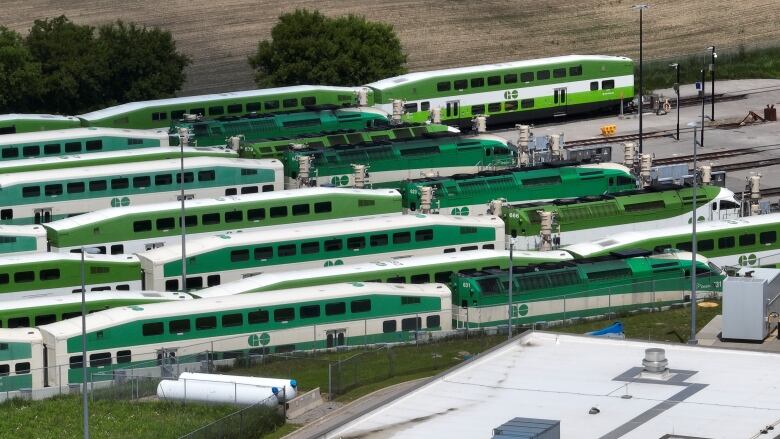Metrolinx approves new fine regime for fare evasion on GO Transit
Metrolinx board signs off on new fine structure at Thursday meeting

A new regime of fines for fare dodgers on GO Transit has been approved Thursday by the agency that runs the service as it attempts to recover more lost revenue.
Metrolinx's board of directors adopted the new graduated fee structure for fare evasion at a board meeting.The new system comes into effect on Oct. 10. Agency staff say they believe the planwould help recover lost ridership revenue, but also instill a sense of fairness for all riders.
"This tiered approach is not intended to be punitive but rather would serve as a general and escalating deterrent to change or alter customer behaviour as it relates to fare payment responsibility," a report to the board said.
The report proposes putting an end to the $100 tickets currently given to passengers found travelling without a fare, and replacing it with asystem that would hand outdifferent finesdepending on the severity of the offence.
Under the proposed plan, first-time offenders would be fined $35, a second-time offender would receive a $50 ticket and anyone with three offences would face a $100 fine. Someone ticketedfour or more times would receive a provincial offences summons which is currently on the booksand a $200 fine.
That summons would mean theperson needs to attend court for the repeat fare evasion and if convicted could face a fine of up to $5,000.
GO Transit ridership rebounds
The proposal comes as GO Transit ridership continues to recover after numbers plummeted early in the pandemic. Ridership for April through June increased by 91 per cent, with 8.3 million boardings, compared to 4.4 million from January to March.Metrolinx saysthat's up from approximately two million riders during the same period last year.
While the report makes the case forincreasingfines, it doesn't spell out the extent of the problem.CBC Toronto asked Metrolinxtoprovide information about levels of fare evasion on GO Transit and the resulting revenue loss but the agency did not provide it in time for the publication of this story.
"This new approach to managing fare-related offences would enable Metrolinx to recover lost revenue while ensuring a fair, consistent approach for fare evaders, while improving the perception of fairness among compliant customers," the Metrolinx staff report said.
Transit advocate says fines are "wrong approach"
The proposed changes would also eliminate so-called "educational notices" fare inspectors could issue instead of fining a rider for a minor infraction.
However, the agency saidpassengers will have the ability to dispute fines.
We have concerns about how this is going to play out on GO Transit.- Shelagh Pizey-Allen,TTCRiders
Public transit advocate Shelagh Pizey-Allen of TTCRiders said the possible changes to the GO Transit fare evasion structure arethe wrong approach.
All transit agencies are trying to recover from the impact of low pandemic ridership, but they shouldn't be done by cracking down on the small segment of people who don't pay their fares, she added.
Instead, "public transit agencies should be going after higher levels of government for ongoing funding support," she said.
Pizey-Allen said she's worried about who will be fined during any enforcement blitz, saying these efforts on other transit systems tend to target the unhoused, people with low incomes or Black and Indigenous transit users.
"We have concerns about how this is going to play out on GO Transit," she said.
The Metrolinx board report said the proposal for the graduated fee structure was developed through an "anti-racism-focused lens to prevent and remove any discrimination or bias in the design, application, training, community outreach and accountability mechanisms of the program and ensure the fair and equitable treatment of all passengers."












_(720p).jpg)


 OFFICIAL HD MUSIC VIDEO.jpg)
.jpg)



























































































